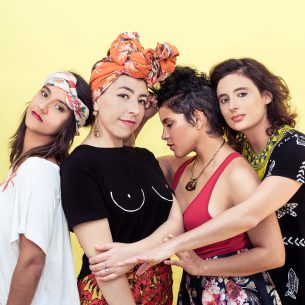“That’s our philosophy—to create is to exist, si creas, existes,” declares Daniela Serna, one of the four women who founded the Panamerican ensemble of LADAMA after being brought together by the prestigious OneBeat Fellowship in 2014.
OneBeat took Serna, a Bogotá-based composer, percussionist, educator and sound artist, along with Lara Klaus. a Recife, Brazil-based percussionist, educator, drummer, singer and composer, Sara Lucas, a New York-based singer, songwriter and guitarist and Maria Fernanda Gonzalez, a Barquisimeto-based multi-instrumentalist and journalist, to tour California, Arizona, and New Mexico, all selected as part of a group of 25 musicians from around the world to represent each of their countries.
OneBeat changed their lives, says Serna, and after that intense period of being focused on creativity, activism and developing strategies to connect communities through music, the four women decided to continue working together, founding LADAMA with the specific mission of creating music and along the way empowering women as well as improving the situation for women in the music industry.
Today, LADAMA’s members are still based in each of their respective countries—Colombia, Venezuela, Brazil and the USA–and reunite approximately twice a year tour. Through their compositions, the four musicians continue to explore the connections between their individual musical legacies and roots music. Some songs, such as “Porro Maracatu”—a vibrant mashup of the Afro Colombian porro and the Afro Brazilian maracatu—came about directly inspired by their travels together in South America.
And in the spirit of the OneBeat philosophy, for LADAMA, there is no separation between activism and art, says Serna: “The social and the music should be one.” From their bases in their respective countries, each of the four women continues to work as an educator and an activist “one hundred percent”, says Serna, citing examples of their projects that include work with teenage women and students with Down’s Syndrome. She describes that their greatest accomplishment has been to see how LADAMA has encouraged so many express themselves through music and how the tools to do that and work to live your own dreams “changes how you see life and how you face life.”
Along with New York City bass player Pat Swoboda, LADAMA’s creates contemporary tunes with touches of R&B and soul in Spanish, English and Portuguese. They bring to the musical table rousing grooves, tight and potent vocals and superb skills on the Venezuelan bandola llanera, Colombia’s tambor alegreand the pandeiro from Northeastern Brazil.
Yet despite the many influences that inform their creations, LADAMA’s music is not a generic or bland fusion; each tune reveals marked textures and surprising flavors. Serna describes that what makes their music special is the strength of their individual diversity. She laughs as she describes that, for example, no matter how much she teaches her bandmate Lara Klaus the finer details of the cumbia, “…she will swing it with a Brazilian flavor! Cumbia with a Brazilian flavor, that’s what makes it special!” Each part of their musical worlds is connected in surprising ways, says Serna, and each is unique: “LADAMA wants the audience to feel the connections and feel that you are in many places at the same time.”
—
Chicago audiences have two opportunities to experience LADAMA live: At Old Town School of Folk Music May 9th at 8:30 PM and at Segundo Ruiz Belvis Cultural Center May 10th at 7pm.
—
 Check out Beat Latino, Catalina’s weekly exploration of the past, present and future of Latinx music.
Check out Beat Latino, Catalina’s weekly exploration of the past, present and future of Latinx music.
 Check out Beat Latino, Catalina’s weekly exploration of the past, present and future of Latinx music.
Check out Beat Latino, Catalina’s weekly exploration of the past, present and future of Latinx music.
